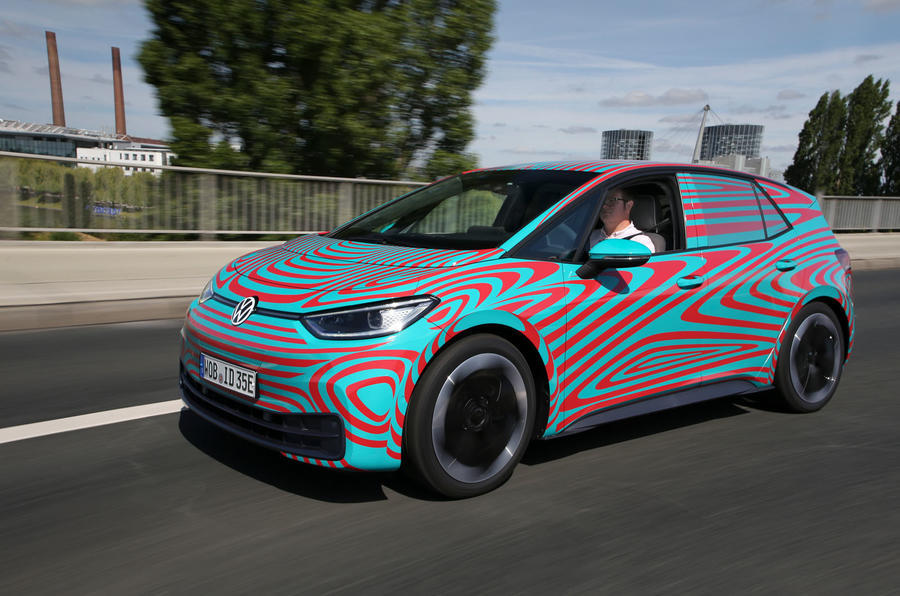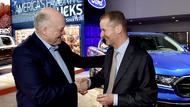Volkswagen to invest in Ford-backed autonomous tech firm in exchange for use of modular EV platform in global alliance
Ford and Volkswagen have jointly announced the expansion of their global alliance will include electric vehicles, along with a massive investment in autonomous technology and joint development of commercial vehicles.
The deal allows Ford to make use of the German giant’s MEB modular electric platform for “at least one high volume fully electric vehicle in Europe”, to launch in 2023. Ford plans to deliver more than 600,000 MEB-based vehicles over a six-year period from 2023, though no specific bodystyle has been confirmed for the first model.
VW CEO Herbert Diess talked about the possibility of a second MEB-based model line for Ford, too, suggesting the next model could “almost double” the supply of MEB components to Ford.
Volkswagen will supply the platform plus “battery packs and structural components” to the US brand. Ford will design its own car at its facility in Cologne, Germany, but is yet to announce where it will assemble the model. Ford CEO Jim Hackett confirmed that faciity would be one of its existing European plants, however.
Analysis: what Ford and Volkswagen’s tie-up means
Volkswagen CEO Herbert Diess claimed the scaling of the MEB platform in this way “drives down development costs for zero-emissions vehicles, allowing for a broader and faster adoption,” saying: “This improves the position of both companies through greater capital efficiency, further growth and improved competitiveness”. Both manufacturers will continue to explore further joint avenues into electric mobility.
Diess also confirmed VW’s intention to have produced 15 million MEB-based EVs globally in the next ten years – with a lineup of 70 all-electric models across its brand portfolio. These will include “high volume small city cars and large limousines, through to electrically powered camper vans”.
The VW Chairman confirmed why it is putting almost all of its eggs in the EV basket for the near future, claiming he does not see alternatives such as synthetic, low emission fuels gaining greater market penetation until “at least the middle of the next decade” – and even then the scale will not be extensive enough.

The second major cornerstone in Volkswagen and Ford’s relationship is an investment by the German firm in Argo AI, an autonomous car company that Ford first backed in 2017.
Volkswagen will put forward just under £2.1 billion – including £800 million in direct funding and the transferring of its own Autonomous Intelligent Driving (AID) company, valued at £1.28bn – as well as purchasing shares from Ford over a three-year period. This increases the total valuation of Argo AI to more than £5.6bn.
The car makers claim Argo AI’s self-driving system is the first with commercial deployment plans for Europe and the US. It plans to deliver a Level 4-capable self-driving system for “ride sharing and goods delivery services in dense urban areas”.
Argo’s self-driving system is said to be the one with the most potential to scale rapidly and extensively, with the first commercial rollout scheduled for 2021. Next year it will begin road trials of its well-developed system in locations such as Washington, Palo Alto, Pittsburgh, Miami and Detroit.
Ford CEO Jim Hackett said: “While Ford and Volkswagen remain independent and fiercely competitive in the marketplace, teaming up and working with Argo AI on this important technology allows us to deliver unmatched capability, scale and geographic reach”.
Both firms also talked about their previously confirmed collaboration to develop commercial vans and pick-up trucks together. They are expecting demand in these segments to grow over the next five years.
Ford will engineer and build a medium-sized pick-up to be sold by both brands in Europe, Africa, the Middle East, Asia Pacific and South America from 2022.
The American firm will also be in charge of a large van for European customers in the same year, while Volkswagen will build a “city van for sale in Europe and other select markets”. Key models, such as Ford’s Transit and Ranger, plus Volkswagen’s Transporter and Caddy, will remain in the brands’ respective line-ups.
The Wolf of Wolfsburg: Autocar meets Volkswagen boss Herbert Diess
Source: Autocar
